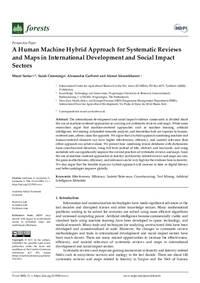A Human Machine Hybrid Approach for Systematic Reviews and Maps in International Development and Social Impact Sectors

Authors:
The international development and social impact evidence community is divided about the use of machine-centered approaches in carrying out systematic reviews and maps. While some researchers argue that machine-centered approaches such as machine learning, artificial intelligence, text mining, automated semantic analysis, and translation bots are superior to human-centered ones, others claim the opposite. We argue that a hybrid approach combining machine and human-centered elements can have higher effectiveness, efficiency, and societal relevance than either approach can achieve alone. We present how combining lexical databases with dictionaries from crowdsourced literature, using full texts instead of titles, abstracts, and keywords. Using metadata sets can significantly improve the current practices of systematic reviews and maps. Since the use of machine-centered approaches in forestry and forestry-related reviews and maps are rare, the gains in effectiveness, efficiency, and relevance can be very high for the evidence base in forestry. We also argue that the benefits from our hybrid approach will increase in time as digital literacy and better ontologies improve globally.
